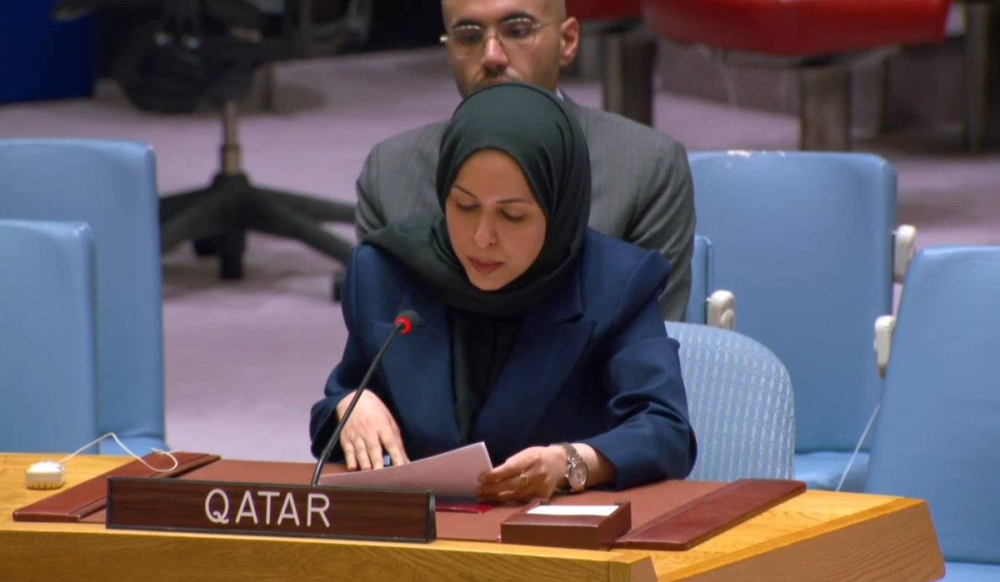Qatar welcomed the progress made by partnerships among the UN Security Council, regional and sub-regional organisations, and bilateral frameworks to enhance conflict prevention, preventive diplomacy, peacekeeping, and peacebuilding efforts.
An example of such partnerships is that among the UN Security Council, the African Union, the Arab League, and the Organisation of Islamic Co-operation.
This came in a statement delivered by Qatar's Permanent Representative to the UN HE Sheikha Alya Ahmed bin Saif al-Thani before the Security Council's open discussion session on "Peace through dialogue: the contribution of regional, subregional, and bilateral arrangements to the prevention and peaceful resolution of disputes."
HE Sheikha Alya expressed Qatar's pride in its foreign policy strategy and priorities that are founded on the pillars of preventive diplomacy, dialogue, and mediation, with the country enjoying a rich record of effective and successful mediation efforts regionally and internationally, contributing to reduced escalation and maintaining international peace and security.
She added that Qatar approaches peace comprehensively, considering peace as not just the cessation of violence and/or fighting, but rather considering that a comprehensive and sustainable peace is one that is based on preventive measures and addressing root causes of conflict, including developmental and humanitarian interventions, as well as providing women and the youth with economic empowerment opportunities.
She added that Qatar believes that the UN Charter provides a good basis and framework for the peaceful resolution of disputes in accordance with the UN Charter's Article 33 of Chapter VI and Chapter VIII that supports the role and efforts of regional and sub-regional organisations in promoting dialogue, preventive diplomacy, and resolving disputes by peaceful means in the context of maintaining international peace and security.
Moreover, she referred to the relevant Security Council resolutions, such as UN Security Council Resolution 1625 (2005), through which the Council affirmed its determination to strengthen the United Nations' capacity to prevent the outbreak of conflicts, by supporting regional mediation initiatives, close consultation with regional subregional organisations, in addition to Resolution 2171 (2014), which called for strengthening co-operation and capacity-building with regional and sub-regional organisations and arrangements to help prevent conflicts, their spread and impact, especially since these regional and subregional organisations and arrangements are more aware of what is going on in their areas of jurisdiction and geographical space.
HE Sheikha Alya renewed Qatar's support for the Secretary-General's reports entitled "Our Common Agenda and A New Agenda for Peace".
She referred to brief 11 of A New Agenda for Peace, which emphasizes the importance of strong partnerships between the UN and regional organisations, to invest in diplomacy and preventive measures to avert the outbreak of violence and conflicts, as well as to support peacemaking efforts through mediation and dialogue.
She added that this session is taking place during a time of escalating humanitarian crises and armed conflicts in an ever-changing world, particularly in the Middle East with the recent developments in the Gaza Strip and their humanitarian repercussions, necessitating intensive regional and international coordination efforts in light of the current exceptional circumstances, adding that these conflicts' long duration, their periodic outbreak, and their threat to regional and international security and peace, necessitate the international community to adopt a more comprehensive and effective approach in order to ensure the achievement of a just, comprehensive, and sustainable peace that addresses the roots of the conflicts, especially the Middle Eastern one.
HE Sheikha Alya highlighted the importunate that the international community engages in this open discussion in order to anticipate the prospects and aspirations of the Summit of the Future in 2024, prepare for the 2025 Review of the Peacebuilding Architecture, as well as reflect on the outcomes of the SDG Summit held last September.
She pointed out that facing the challenges of new conflicts and their accelerating changes requires the Council to assume its responsibilities in accordance with the UN Charter and its relevant resolutions, calling for the strengthening of partnerships and joint initiatives together with regional, sub-regional, and bilateral organisations and arrangements, in the framework of preventive diplomacy, preventing the outbreak of conflicts, solving them through peaceful means via continuous joint meetings and visits.
She called for investing in early warning systems and mechanisms, supporting peacekeeping and peacebuilding efforts in accordance with a comprehensive reform plan, adopting a comprehensive approach and methodology, in addition to being adaptive and flexible to changes in conflicts, within the UN Secretary General's framework of a New Agenda for Peace.

HE Sheikha Alya Ahmed bin Saif al-Thani
